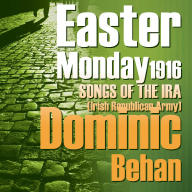He joined the IRA's youth division, and by the early '50s had been arrested for leading protests against government economic policies that he felt were unfair to working families. He also published his first poems and articles through the IRA. Behan and his wife, the former Josephine Quinn, became active in the Communist Party in the 1950s, and embraced numerous leftist causes, and later emigrated to England, where he worked for the BBC, writing radio scripts. He also authored the play +Posterity Be Damned, which was produced in Dublin in 1959 and dealt with republican activity after the Civil War. And he gained enormous critical respect for his autobiographical novel -Teems of Times (1961), which was dramatized on television in 1977.
Behan wrote numerous songs, including such notable compositions as Come Out Ye Black and Tans and The Patriot Game. The latter song, the melody of which he borrowed from a traditional Irish source dating from the 17th century, was a compelling and bitter account of the Irish War of Independence and its aftermath, and the lingering strife in the north -- it quickly became known around the world, in the hands of the Clancy Brothers with Tommy Makem, and a brace of notable American artists, including Judy Collins. And it provided both the melody and the poetic template for Bob Dylan's With God on Our Side, an epic anti-war song that adapted Behan's sensibilities to the era of nuclear war. Behan was not pleased, or amused, or complimented by Dylan's effort, and did his best to challenge the American's integrity and originality. His activist orientation also made him critical of the Clancy Brothers and others who presented the song without its angriest topical verses. Behan recorded intermittently starting in the late 1950s, and one of his most notable achievements was The Singing Streets: Childhood Memories of Ireland and Scotland, recorded in conjunction with Ewan MacColl and released on Folkways Records. And according to rumor, he also worked under pseudonyms -- it has been rumored for decades that the 1963 English Decca LP Irish Rebel Songs featured Behan working under the names Diarmuid O'Neill and Patrick O'Malley, in conjunction with Enoch Kent.
One of Behan's television plays, #The Folk Singer (1972), dealing with the strife in Northern Ireland, was adapted to theater and presented during the renewed fighting at the Lyric Theater in Belfast. But for all of his activism and his efforts at writing topical theater and television, Behan was probably most successful and notable as a composer, with over 450 songs to his credit, among them McAlpine's Fusiliers, Avondale, The Merry Ploughboy, Famine Song, and Liverpool Lou. Additionally, he has been honored in song by no less a figure than Dave Cousins of the Strawbs, who wrote his song Josephine, For Better or for Worse in honor of Dominic and Josephine Behan. He was also praised in an interview with John Lennon in the early 1970s. Behan died of cancer at his home in Glasgow, Scotland, at the age of 60. ~ Bruce Eder, Rovi












